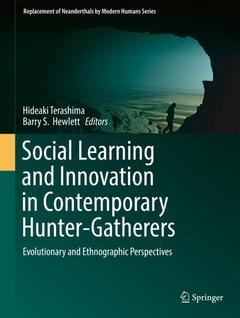Social Learning and Innovation in Contemporary Hunter-Gatherers, Softcover reprint of the original 1st ed. 2016 Evolutionary and Ethnographic Perspectives Replacement of Neanderthals by Modern Humans Series
Coordonnateurs : Terashima Hideaki, Hewlett Barry S.

This is the first book to examine social learning and innovation in hunter?gatherers from around the world. More is known about social learning in chimpanzees and nonhuman primates than is known about social learning in hunter?gatherers, a way of life that characterized most of human history. The book describes diverse patterns of learning and teaching behaviors in contemporary hunter?gatherers from the perspectives of cultural anthropology, ecological anthropology, biological anthropology, and developmental psychology. The book addresses several theoretical issues including the learning hypothesis which suggests that the fate of Homo sapiens and Neanderthals in the last glacial period might have been due to the differences in learning ability. It has been unequivocally claimed that social learning is intrinsically important for human beings; however, the characteristics of human learning remain under a dense fog despite innumerable studies with children from urban?industrial cultures. Controversy continues on problems such as: do hunter?gatherers teach? If so, what types of teaching occur, who does it, how often, under what contexts, and so on. The book explores the most basic and intrinsic aspects of social learning as well as the foundation of innovative activities in everyday activities of contemporary hunter?gatherer people across the earth. The book examines how hunter-gatherer core values, such as gender and age egalitarianism and extensive sharing of food and childcare are transmitted and acquired by children. Chapters are grouped into five sections: 1) theoretical perspectives of learning in hunter?gatherers, 2) modes and processes of social learning in hunter?gatherers, 3) innovation and cumulative culture, 4) play and other cultural contexts of social learning and innovation, 5) biological contexts of learning and innovation. Ideas and concepts based on the data gathered through an intensive fieldwork by the authors will give much insight into the mechanisms and meanings of learning and education in modern humans.
Is the first and only book on social learning in hunter–gatherers
Employs multidisciplinary (biological and cultural anthropology, developmental psychology, education) theoretical and methodological approaches to understanding social learning and innovation in hunter–gatherers
Emphasizes field-based studies of hunter–gatherers
Integrates and utilizes field-based ethnography to address theoretical issues in archaeology and prehistory
Date de parution : 11-2016
Ouvrage de 318 p.
21x27.9 cm
Date de parution : 06-2018
Ouvrage de 318 p.
21x27.9 cm



